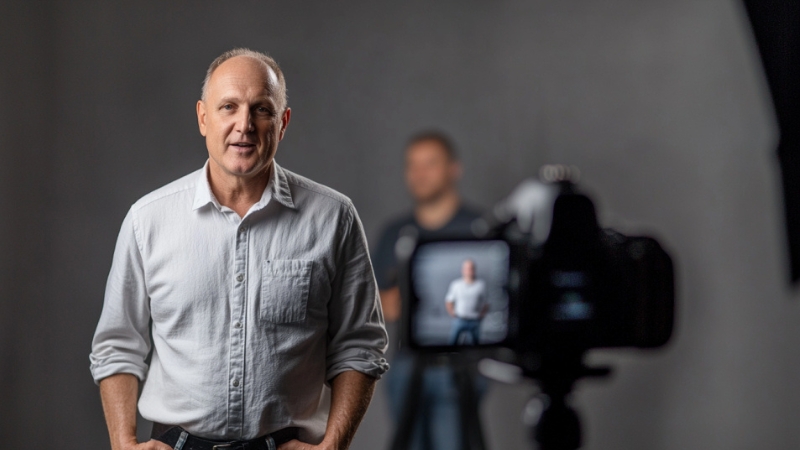In show business, there’s no one-size-fits-all path to becoming an actor or actress. Success stories vary as much as the performers themselves. Here are a few examples:
- Octavia Spencer spent years in minor roles before earning both fame and an Oscar.
- Jonathan Groff, a two-time Tony nominee, landed his first national tour from a Backstage casting notice.
- Aaron Paul, a three-time Emmy winner, was discovered at an acting and modeling competition after moving to Los Angeles from Idaho.
These are just three of the countless routes to acting success. But one thing is certain: when opportunity knocks, you must be ready to give it your all. Below, you’ll find everything you need to know to begin your journey as an actor, whether your dreams lead to Hollywood, Broadway, or somewhere in between.
How to Become an Actor in 5 Steps
There’s no definitive roadmap to acting success, but most actors follow similar steps to establish their careers. Here’s how to get started:
- Get Involved in Local Theater – It’s never too late to start acting, but early experience helps. Participate in high school drama or community theater to build confidence, learn collaboration, and hone your craft.
- Take Acting Classes – While formal education isn’t mandatory, training is invaluable. Explore drama classes, local workshops, or degree programs like a BFA or MFA in theater. Summer programs can also sharpen your skills.
- Prepare Key Materials – Casting directors expect a professional headshot, résumé, and demo reel. These tools grow with your career as you take on new roles and polish your craft.
- Audition for Roles – Gaining experience is crucial, even in smaller roles like extras or community theater. Platforms like Backstage and local casting calls are great resources to get started.
- Find an Agent – An agent can open doors to bigger roles and major projects. While not essential early on, representation becomes vital as your career progresses.
Is It Hard to Become an Actor?
Breaking into the entertainment industry is no easy feat. It demands a mix of raw talent, relentless dedication, resilience in the face of rejection, and a network of connections that often take years to build.
While luck can play a role in opening doors, it’s the hard work and preparation that ensure you’re ready when opportunity strikes. Before embarking on this challenging path, it’s important to reflect on your motivations.
Are you driven by a genuine passion for the craft, the joy of storytelling, or the thrill of performing? If so, you’ll find the energy to navigate the inevitable ups and downs of the industry.
However, if fame and fortune are your primary goals, you may face greater disappointment, as these rewards are far from guaranteed and often come after years of perseverance.
Acting is as much about the process as it is about the result. Celebrated casting director Ilene Starger emphasizes the importance of focusing on the work itself. Those who are deeply committed to honing their craft and embracing the journey often find more fulfillment and longevity in their careers.
While the allure of red carpets and stardom is strong, the true rewards lie in the art of acting itself—connecting with audiences, bringing characters to life, and contributing to meaningful projects.
How Long Does It Take to Become an Actor?

The phrase “overnight success” is one of the most misleading in the entertainment world. For most actors, success is the culmination of years—sometimes decades—of tireless effort, constant auditions, and relentless rejections.
Academy Award-winning actor Octavia Spencer famously remarked that it took her 15 years to become an “overnight success,” a sentiment echoed by countless performers who have endured similar journeys. The road is often long and unpredictable, but persistence and patience are crucial.
Aspiring actors should be prepared for the reality that progress may come in small, incremental steps rather than giant leaps.
The industry can be slow to recognize emerging talent, and many actors spend years working in smaller roles or unpaid projects to build their résumés and networks.
Rejections are a constant, even for seasoned professionals, but each audition and every project contributes to personal and professional growth.
Actors who can view setbacks as opportunities to learn and improve often have a better chance of sustaining a successful career in the long run.
Different Types of Actors
Acting encompasses a wide variety of mediums. Here are a few:
- Screen Actors: Film, television, commercials, and web series
- Stage Actors: Broadway, off-Broadway, and regional theater
- Voice Actors: Animation, video games, audiobooks, and podcasts
Each medium requires different techniques, and many actors transition between them throughout their careers.
Actor Education Requirements
View this post on Instagram
No formal education is required, but most actors train at some point. Options include:
- Acting Classes: Local workshops, improv classes, or audition technique courses
- Summer Programs: Great for younger actors to network and develop skills
- Higher Education: BFAs and MFAs can offer structured training and connections, particularly for stage actors
What You Need for an Audition
Preparation is critical. Essential materials include:
- Headshot: A professional, color 8” x 10” photo showcasing your face.
- Acting Résumé: A concise summary of your experience, training, and special skills.
- Demo Reel: A two-minute video highlighting your acting abilities.
How to Find Acting Auditions and Casting Calls
- Leverage Connections: Ask teachers, friends, and colleagues about opportunities.
- Online Casting Platforms: Sites like Backstage offer thousands of casting notices for projects big and small.
- Social Media: Follow casting directors and use hashtags like #CastingCall.
- Local Film Offices: Many regions have film commissions that list local casting calls.
Some actors also create their own projects, as seen with Issa Rae (“Insecure”) and Rachel Bloom (“Crazy Ex-Girlfriend”).
What to Expect at Auditions
What do you do at an audition?https://t.co/QzkZ8QNVCE
— Acting Magazine (@ActingMagazine) October 21, 2024
Auditions are where preparation meets opportunity. To make a strong impression, you need to show professionalism, confidence, and adaptability. Here’s what you should expect and how to prepare:
- Understand the Project – Research the project thoroughly. Whether it’s a film, TV show, or theater production, know the tone, style, and background. Understand the character you’re auditioning for, and if possible, watch or read the work of the director or writers to grasp their creative vision.
- Know Your Lines – Memorization is key, but so is flexibility. Be familiar with your lines so you can focus on delivering them naturally, not just reciting them. Be ready to adapt your performance if the casting director asks you to try a different approach.
- Bring Confidence, Not Desperation – Confidence shows that you’re capable and professional, while desperation can be off-putting. Even if you’re nervous, approach the audition as an opportunity to showcase your talent—not a make-or-break moment.
- Be Adaptable – Casting directors often test an actor’s ability to take direction on the spot. If they ask you to tweak your delivery, embrace the challenge—it’s a chance to show your versatility.
- Presentation Matters – Dress appropriately for the role but avoid full costumes. Your outfit should suggest the character without overshadowing your performance. Bring all required materials, such as headshots and résumés, and ensure they’re up to date.
How to Get an Acting Agent
Securing an agent can feel like a daunting step, but with the right foundation, it’s achievable. Here’s how to approach it:
- Build Experience First – Before seeking representation, focus on training and gaining experience. Attend acting classes, participate in community theater, and build a demo reel with short films, student projects, or local commercials. Agents are more likely to consider you if you have a solid résumé and reel.
- Research Agents in Your Field – Not all agents specialize in every medium. Some focus on film and TV, while others concentrate on theater or voiceover work. Identify agencies that represent actors in your niche and research their reputations. Look for agents who represent actors with careers you admire.
- Prepare Your Submission – Your submission package should include a professional cover letter, headshots, and a résumé highlighting your experience and special skills. If you have a demo reel, include a link or digital file. Keep your materials concise and professional—agents don’t have time to sort through cluttered submissions.
Where to Live if You Want to Be an Actor

Your career goals will dictate where you live:
- Los Angeles: Best for film and TV
- New York City: Ideal for theater
- Regional Markets: Cities like Atlanta and New Orleans offer growing opportunities and lower living costs.
How Much Do Actors Make?
Earnings for actors vary significantly based on experience, medium, and the scope of the role. While blockbuster stars and established performers can make millions, the vast majority of actors earn more modest paychecks. Let’s break down the numbers and explore some real-world examples.
Film Actors
@reel.takes Leonardo DiCaprio’s salary for Killers of the Flower Moon will blow you away, especially when compared to the entire production budget. I’ve also included for reference Dicaprio’s take on his other colabations with Martin Scorsese, including the aviator, gangs of new york, wolf of wall street, and the departed. #leonardodicaprio #martinscorsese #thedeparted #killersoftheflowermoon #robertdeniro #wolfofwallstreet #movies #film #fyp ♬ original sound – Reel Takes
For lead roles in major motion pictures, salaries often start at $65,000 and can skyrocket into the millions for A-list actors. For instance, Leonardo DiCaprio reportedly earned $30 million for his role in Don’t Look Up. Meanwhile, lesser-known actors or those playing supporting roles may earn closer to $100,000–$300,000 per project, depending on the production budget.
At the independent film level, pay is often much lower. Actors in indie films might earn as little as $1,000–$5,000, though these projects can be valuable for building a résumé and showcasing talent. Jennifer Lawrence, for example, worked on smaller indie films before breaking out in Winter’s Bone, which earned her an Academy Award nomination and catapulted her career.
Television Actors
TV actors’ earnings depend on the show’s platform, budget, and popularity.
- Guest Stars: Typically make $5,951–$9,522 per episode, depending on whether it’s a half-hour comedy or an hour-long drama.
- Series Regulars: Actors who land recurring roles on popular shows often negotiate higher salaries. For example, the main cast of Friends famously renegotiated their contracts to earn $1 million per episode in the show’s later seasons.
- Streaming Services: Platforms like Netflix and Amazon Prime are known for higher pay rates. Millie Bobby Brown, for instance, reportedly earned $250,000 per episode for Stranger Things Season 3.
Broadway Actors
The minimum salary for Broadway performers is $2,439 per week, as per the Actors’ Equity Association contract. However, lead actors in hit productions like Hamilton or The Lion King often earn far more, thanks to bonuses and profit-sharing arrangements.
Some big-name stars who join Broadway productions, like Daniel Radcliffe (Equus, How to Succeed in Business Without Really Trying), negotiate salaries upward of $75,000 per week.
Off-Broadway actors, on the other hand, earn less, with weekly salaries ranging from $689 to $1,526, depending on the production’s size and budget.
Voice Actors
View this post on Instagram
Voice acting is another lucrative niche for some performers. Experienced voice actors, especially those working in animation or video games, can earn $1,000–$4,000 per session. For example, Nancy Cartwright, the voice of Bart Simpson on The Simpsons, reportedly makes $300,000 per episode.
Commercial Work
Commercials can be a surprising goldmine. Actors in national ad campaigns may earn $20,000–$50,000, including residuals. Stephanie Courtney, the face of Progressive Insurance’s Flo, is said to earn around $1 million per year due to her recurring role.


